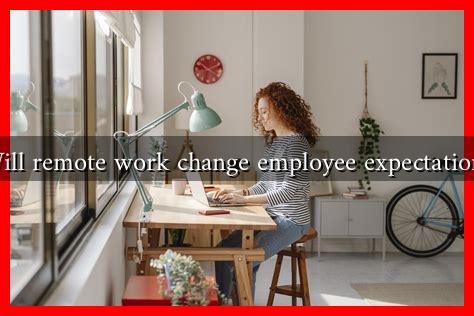-
Table of Contents
Will Remote Work Change Employee Expectations?
The COVID-19 pandemic has accelerated the adoption of remote work, transforming the traditional workplace landscape. As organizations adapt to this new normal, employee expectations are evolving. This article explores how remote work is reshaping what employees seek from their jobs, the implications for employers, and the future of work.
The Shift to Remote Work
Before the pandemic, remote work was often seen as a perk rather than a standard practice. However, as companies were forced to adapt to lockdowns and social distancing measures, many discovered that remote work could be both productive and beneficial. According to a report by Stanford University, productivity increased by 13% among remote workers, leading to a reevaluation of work structures.
Changing Employee Expectations
As remote work becomes more commonplace, employees are developing new expectations regarding their work environments, job roles, and overall work-life balance. Here are some key changes in employee expectations:
- Flexibility: Employees now prioritize flexible work hours and the ability to manage their schedules. A survey by Buffer found that 32% of remote workers cited flexibility as the biggest benefit of working from home.
- Work-Life Balance: The lines between work and personal life have blurred, leading employees to seek better work-life integration. Many are now looking for employers who support mental health and well-being.
- Technology and Tools: With remote work, employees expect companies to provide the necessary technology and tools to facilitate effective communication and collaboration. This includes access to software, hardware, and training.
- Career Development: Remote workers are increasingly interested in opportunities for professional growth. They expect employers to offer training programs, mentorship, and pathways for advancement, regardless of their physical location.
- Company Culture: Employees are now more focused on company culture and values. They want to work for organizations that align with their personal beliefs and foster a sense of community, even in a virtual environment.
Case Studies: Companies Leading the Way
Several companies have successfully adapted to remote work and have set examples for others to follow. Here are a few notable case studies:
- GitLab: As a fully remote company, GitLab has developed a comprehensive guide to remote work that emphasizes transparency, communication, and inclusivity. Their approach has resulted in high employee satisfaction and retention rates.
- Zapier: Zapier has embraced a remote-first culture, offering flexible schedules and a strong focus on employee well-being. They provide stipends for home office setups and encourage regular check-ins to maintain team cohesion.
- Salesforce: Salesforce has committed to a hybrid work model, allowing employees to choose between in-office and remote work. This flexibility has led to increased employee engagement and productivity.
The Future of Work
As remote work continues to evolve, organizations must adapt to meet changing employee expectations. Here are some trends to watch for in the future:
- Hybrid Work Models: Many companies are likely to adopt hybrid models, combining remote and in-office work to provide flexibility while maintaining team collaboration.
- Focus on Employee Well-Being: Employers will increasingly prioritize mental health resources and support systems to help employees navigate the challenges of remote work.
- Enhanced Communication Tools: The demand for advanced communication and collaboration tools will grow, as companies seek to bridge the gap between remote and in-office employees.
- Global Talent Pool: Remote work allows companies to tap into a global talent pool, leading to more diverse teams and perspectives.
Conclusion
The shift to remote work is undeniably changing employee expectations. As flexibility, work-life balance, and career development become paramount, organizations must adapt to meet these new demands. Companies that embrace these changes and prioritize employee well-being will not only attract top talent but also foster a more engaged and productive workforce. The future of work is here, and it is remote.
For more insights on remote work trends, you can visit Forbes.

